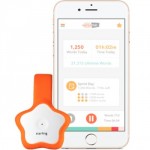 The so called vocabulary gap is well known, with a famous study from the University of Virginia claiming that there is a 30 million strong difference between the words heard by children of working class families compared to high income families.
The so called vocabulary gap is well known, with a famous study from the University of Virginia claiming that there is a 30 million strong difference between the words heard by children of working class families compared to high income families.
This disparity then translated itself into poorer performance in a whole range of indicators as the child grew, including educational prospects, work opportunities and general quality of life.
This challenge has prompted a wide range of policy interventions aimed at early years development, but the problem has proven somewhat tricky to surmount.
A wearable solution
Versame have developed a wearable technology to try and help overcome some of these difficulties. The app, called Starling, is a device that can be clipped onto the child’s clothing or equipment. It allows parents to record the number of unique words spoken to the child each day.
It is also capable of gamifying the process, allowing parents to set targets for themselves. The data from the device is shared with a smartphone app that allows parents to keep tabs on their performance wherever they are.
The device has certainly struck a chord, as it has raised significantly more than its funding target on Indiegogo. I do have a few reservations about it however.
The worried well
We’ve seen with MOOCs that whilst they have enormous potential to provide top quality education to the poor, they have primarily been used by those with education already. Thus far they have failed to really attract the attention of those who could benefit the most.
I fear a similar challenge faces Versame. Will a poorer parent understand the need for such a device, or be able to afford the $129 to purchase it? To really make a difference in highlighting the importance of vocabulary to deprived children, and change the behavior of parents, this is a challenge that needs addressing.
I also wonder about the quality of interactions. Parents having an argument in the presence of their child will no doubt contribute to their ‘score’, but is perhaps not all that beneficial to the development of the child. It doesn’t appear as though the device really caters for quality versus quantity, but I appreciate the inherent challenges in doing this.
So whilst it’s a nice bit of technology with some clear benefits, I do have reservations over whether it will really help those who desperately need it.
Do please check out the video below however and I’d love to hear your thoughts in the comments below.
I can't help but think this is simply a technology doing something that humans could do perfectly well. Just talk to your kid ffs.
Indeed Paul, I do suspect this will be used primarily by the 'worried well'.
Yes, I can just see a Wayne and Waynetta Slob using something like this with their child.